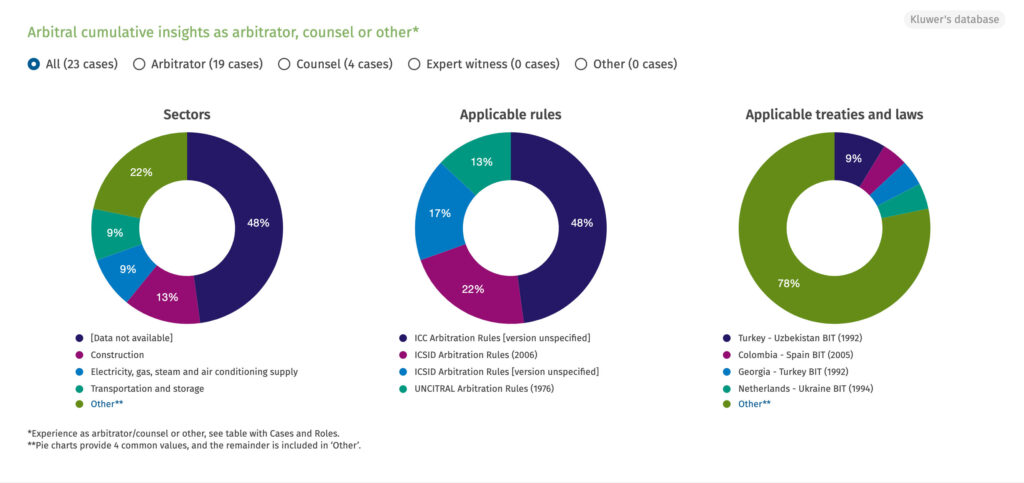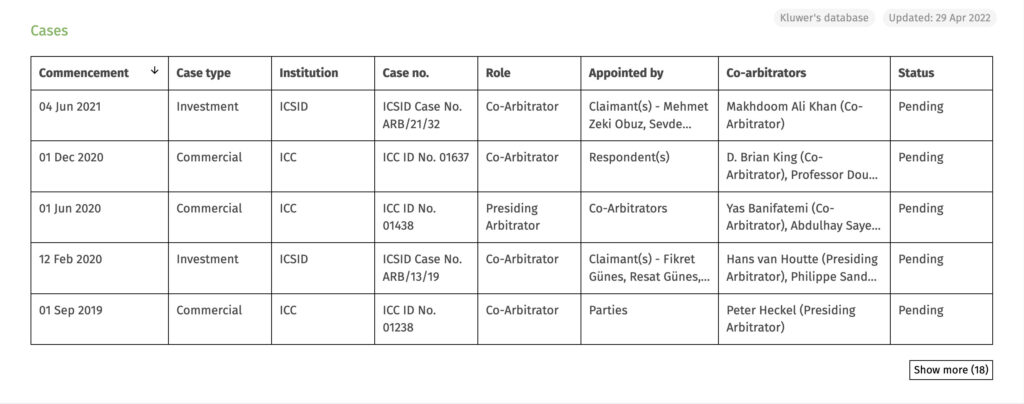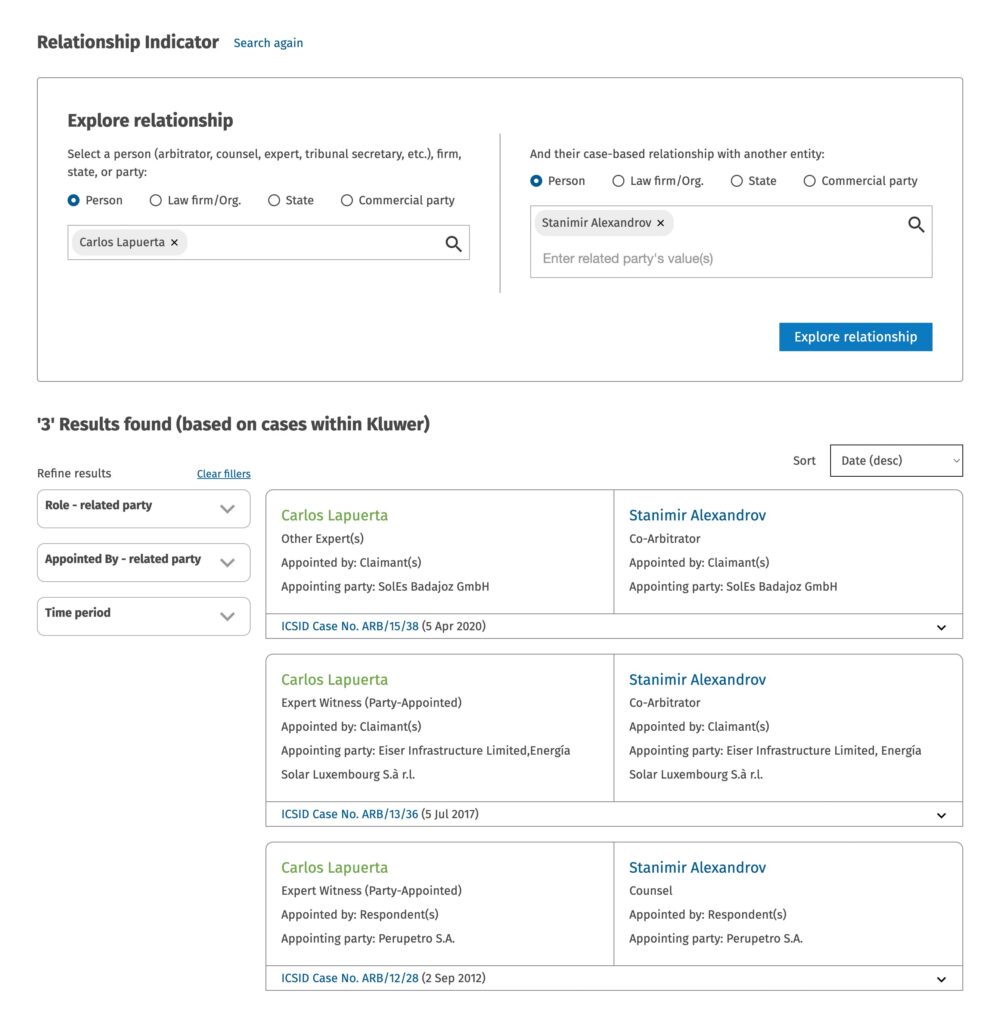Wolters Kluwer recently launched the Profile Navigator and Relationship Indicator tools within the Kluwer Arbitration Practice Plus suite of arbitration products. Kluwer Arbitration Blog recently met with Dr. Nikos Lavranos and Ewa Cairns-Szkatuła to discuss this new development.
Dr. Lavranos is Founder of NL-investmentconsulting and acts as legal counsel, arbitrator, mediator and offers a broad range of services covering investment law and arbitration, EU law and WTO law.
Ewa Cairns-Szkatuła is Associate Director for Technology Product Management at the International Group within Wolters Kluwer Legal and Regulatory US.
- Selecting arbitrators can be a laborious process. What are the Profile Navigator and Relationship Indicator tools, and how can they facilitate better decision-making during arbitrator selection?
Ewa: Indeed, putting the pieces together to gain confidence in the choices you make can be time-consuming. Our tools are based on data extracted from Kluwer Arbitration’s rich collection of commercial and investment awards and from appointment data published by arbitral institutions. Collating the data, the tool can assist in the selection of an arbitrator and in the investigation of potential conflicts of interest of arbitrators as well as other stakeholders involved in the case, such as expert witnesses and counsel. The tools also provides links from the profile to awards and publications associated with the arbitrator, for easy navigation and review of their views and approach.
Nikos: The advantage of these tools is that they help to verify the initial selection of a potential arbitrator by using objective and comprehensive data. They also allows for the consideration of potential arbitrators that were not initially considered. In this way the selection process can be more inclusive and thus help achieve a better balance regarding gender, age, experience and geographical representation.
- How do the new Profile Navigator and Relationship Indicator tools complement existing solutions offered by Kluwer, such as the “practical insights” modules within Kluwer Arbitration Practice Plus?
Ewa: Kluwer Arbitration Practice Plus (KAPP) is a practical extension of Kluwer Arbitration. KAPP provides enhanced support in case preparation and strategy by combining deep domain expertise and comprehensive collection of international awards with practical tools and guidance. Other tools of Practice Plus, such as Practical Insights by Topic or Quick Answers cover, among other arbitration steps, the appointment and challenge of an Arbitrator, including the opportunity to compare by jurisdiction or institutional rules. An advantage of these tools is that they quickly direct users to key information about the topic, thereby allowing users to focus on the subsequent steps of their legal work, such as developing their legal strategy.
- Why are data-driven decisions so important for the field of commercial and investment arbitration?
Nikos: Using data to support decision-making ensures that the decisions taken are supportable and comprehensive. It allows for a comprehensive analysis of all relevant aspects both regarding the suitability of a potential Arbitrator as well as any potential conflicts of interest or issue conflicts. It also helps to reduce the risk of challenges of a selected Arbitrator. Finally, it helps in discussions with the client, who is ultimately the one that must feel comfortable with the selection of the Arbitrator.
Ewa: The stakes in arbitrator selection are high and using data to support these decisions provides confidence in your case strategy and chosen arbitrator. Below is a sneak preview of the Profile Navigator and Relationship Indicator tools, but it only shows a small portion of the extensive information available.




- How do the Profile Navigator and Relationship Indicator tools approach issue conflicts, particularly with regard to the disclosure obligations found within the draft Code of Conduct being discussed at UNCITRAL Working Group III?
Nikos: The new Code of Conduct that will soon be adopted by UNCITRAL Working Group III will impose significant disclosure obligations on potential and selected Arbitrators (more analysis of the UNCITRAL code of conduct, including earlier drafts, here, here and here). These obligations include inter alia the disclosure of all the cases in which the prospective arbitrator was involved in various roles, not only as arbitrator but also as counsel or expert. The comprehensive data provided by KAPP allows all parties involved to verify the information disclosed by the arbitrator. It also enables the user to analyse with whom a prospective arbitrator has worked in past cases. In this way KAPP’s comprehensive tools are already taking into account this development, which in no doubt will spill over into commercial arbitration practice.
- How do you ensure the accuracy and currency of information?
Ewa: Over more than 30 years Wolters Kluwer has developed a reputation for delivering high quality expertise to support decision making. That is where the expertise of Nikos Lavranos comes in as one of our lead Subject Matter Experts (SMEs). We are grateful to have excellent SMEs working on this project in combination with machine learning. Regarding currency of information – we are continuously adding awards from various sources and use robot/automated scraping. Importantly, our technology makes sure to retrieve the information on any new award released publicly and accounts for data that reflects any changes to the tribunal’s composition.
Nikos: Generally, it is important to highlight that all information is double checked by the various layers of SMEs, so that the information in the system is as accurate as possible. If necessary, the data is verified by confirming it with other publicly available information. The system is also constantly updated and new data is rigorously double checked. In this way the combination of machine learning and human data collection and verification ensures the highest possible standard.
- Can arbitrators supplement their own profiles?
Ewa: The data-driven arbitrator profiles that already exist in our database can be supplemented by information that is presented in a structured way. Please contact Eleanor.Taylor@wolterskluwer.com if you would like further information.
- There is still much work to do within the international arbitration community to boost diversity. Do you see the Profile Navigator and Relationship Indicator tools as playing a positive role in profession-wide initiatives to promote diversity, equity and inclusion?
Ewa: Our database includes nearly 14,000 (and growing) professionals including arbitrators, expert witnesses and counsel at all stages of their career, with expertise across all geographies and sectors. All the information is based on data so the user can easily assess the expertise and fit for the case. Our advanced search allows users to search by criteria that fit the case needs and suggests profiles that otherwise would have not been considered. As Nikos has previously mentioned, using objective and comprehensive data allows the selection process to be more inclusive.
- Do you have plans for further enhancements to the Profile Navigator and Relationship Indicator tools?
Ewa: Absolutely. The obvious one is adding more profiles, more awards, more data, and increasing the involvement of artificial intelligence (AI).
The practice of international arbitration has been evolving and our products do as well. By use of technology, combined with our rigorous quality control measures, we want to equip our users with the most comprehensive database of arbitrators and other stakeholders involved in the arbitration process. Applying the data opens many doors and new options on how technology can be applied to other aspects of the arbitration process and decision making.
- What parting words do you have for Kluwer Arbitration Blog readers?
Ewa: We are continuing to expand Kluwer Arbitration’s capabilities as a full-service solution that provides our customers with the right tools to drive to the best possible outcomes during the arbitral process. However, we cannot do it without you. Kluwer Arbitration and KAPP have been developed in collaboration with the arbitration community. Any feedback, including constructive criticism, suggestions and ideas are welcome! We will consider them all.
Nikos: Ultimately, the aim is to provide accurate and comprehensive information to serve the arbitration community in resolving disputes as well and as cost-effective as possible.
Arbitrators wishing to amend their profiles on the Profile Navigator and Relationship Indicator tool can contact Wolter Kluwers here.
Further posts on our Arbitration Tech Toolbox series can be found here.
The content of this post is intended for educational and general information. It is not intended for any promotional purposes. Kluwer Arbitration Blog, the Editorial Board, and this post’s authors make no representation or warranty of any kind, express or implied, regarding the accuracy or completeness of any information in this post.
________________________
To make sure you do not miss out on regular updates from the Kluwer Arbitration Blog, please subscribe here. To submit a proposal for a blog post, please consult our Editorial Guidelines.


